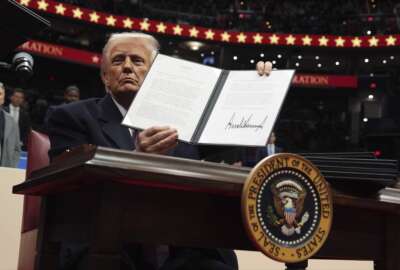Lawmaker says fed pay, benefits used as ‘piggybank’ in deficit reduction
Rep. John Sarbanes (D-Md.), whose district in the Washington, D.C., suburbs is home to many federal employees, said he understands the frustration voiced by...
wfedstaff | April 17, 2015 4:06 pm
When President Barack Obama announced he’d only use use his authority to end the federal pay freeze after Congress passes a budget, federal unions decried the move as a de facto extension of the freeze.
Because lawmakers have already reached an agreement on a short-term spending measure funding the government through the first six months of the fiscal year, feds won’t see a pay raise until at least next spring.

Rep. John Sarbanes (D-Md.), whose district in the Washington, D.C., suburbs is home to many federal employees, said the continuing resolution is all but a done deal. And while it’s not perfect, it’s at least a path forward, he said.
“I think it’s a practical acknowledgment of the reality on Capitol Hill right now and that a CR was probably the best result one could hope for in the current political circumstance,” he told In Depth with Francis Rose.
Still, Sarbanes said he understands the frustration voiced by the unions and other federal advocacy organizations — especially because pay and benefits have frequently been targeted by some lawmakers.
Sarbanes characterized House Republican proposals to officially extend the pay freeze for another year and to require federal employees to contribute more toward their retirement, as treating federal employees’ pay and benefits like a “piggybank.”
Noting the current two-year federal pay freeze that federal unions say has netted the government at least $60 billion in deficit reduction, Sarbanes said he believes federal employees “ought to be taken off the table in terms of additional contributions given what they’ve already put into the mix.”
Sarbanes said he’s worried the constant talk of cuts to federal pay and benefits could impact the morale of federal employees particularly “at a time when we need the best and the brightest to stay in government service and be attracted to government service.”
Sequestration still a concern
The automatic, across-the-board sequestration cuts, set to take effect in January, remain another cloud on the budget horizon.
Sarbanes said he doesn’t yet see a “clear path forward” on deficit negotiations to head off the cuts.
But given the drastic circumstances, he foresees some kind of agreement that will at least “dull the impact” of the cuts Sarbanes said.
“Now, what that agreement will be, what form it will take and what burden will need to be carried in that exercise, it’s impossible to know at this stage,” he said, predicting any action would come after the November election. “But my hope would be that members of Congress and the administration will come together after the election — whatever administration it may be — recognizing that these issues have to be tackled and take what steps are needed to avoid this fiscal cliff.”
RELATED STORIES:
Fed pay raise on hold until after continuing resolution expires
Reid, Boehner announce stopgap spending deal
Copyright © 2025 Federal News Network. All rights reserved. This website is not intended for users located within the European Economic Area.





